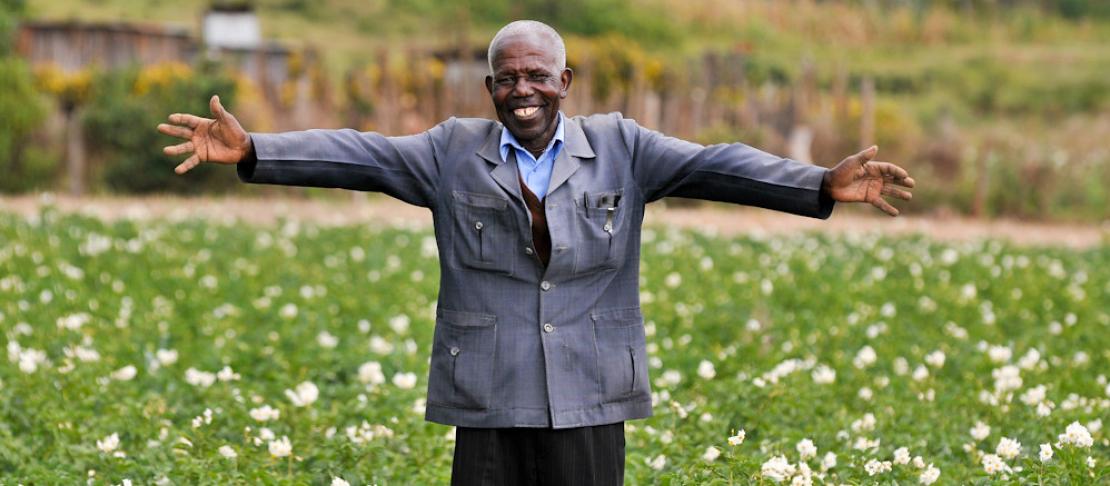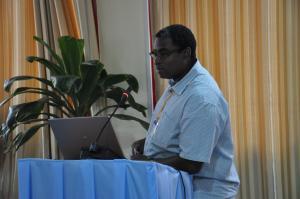Informing policy makers on current agricultural and climate change research in East Africa

by Catherine Mungai, John Recha and James Kinyangi
Africa needs good case studies to showcase vulnerabilities to a changing climate and also good practices for coping with climate variability. This is the key message emanating from the recently concluded side event organized by the CGIAR Research Program on Climate Change, Agriculture and Food Security (CCAFS) East Africa Regional Office. From 10 to 14 September, the 14th session of the African Ministerial Conference of the Environment (AMCEN)was held at the Arusha International Conference Center (AICC) and brought together Ministers from 40 countries. The ministers and delegates met to discuss a common approach to engaging with the international community in the climate change negotiation process, in preparation for the upcoming UNFCCC climate change meeting, COP18 in Qatar.

The AMCEN therefore, was an occasion to highlight how research can be used to inform policy; with a specific focus on the place of agriculture in climate change policy. The regional office team successfully organized the side event; ‘Integrating Food Security and Sustainable Agriculture into Climate Change Polices’. It was attended by more than 50 policymakers from as many as 17 different countries, both African and European. The event was moderated by Yacob Mulugeta of the African Climate Policy Centre (ACPC). Panelists included James Kinyangi, CCAFS East Africa Regional Program Manager, George Wamukoya, Common Market for Eastern and Southern Africa, (COMESA), Steven Muchiri, East African Farmers Federation, (EAFF), Reuben Ottou, CARE International – Adaptation Learning Programme for Africa, (Ghana) and Apurba Shee, Index Based Livestock Insurance project of the International Livestock Research Institute (IBLI).
Topics presented for discussion
- Scientific findings on the potential impact of climate change on agriculture and food security (Commission on Sustainable Agriculture and Climate Change);
- Climate change adaptation and mitigation in agriculture ahead of UNFCCC COP 18 (COMESA);
- Giving voice to the farmers: Experiences from the field (EAFF);
- Using field experiences to inform research and policy (CARE);
- Financial innovations for addressing food security and climate change; the case of Index Based Livestock Insurance: (ILRI).
Following the presentations, discussions were held to further explore the current status of knowledge on impacts of climate change on agriculture and food security, ongoing actions on agricultural adaptation and mitigation, and approaches and tools for managing climate variability.
What is next after the AMCEN side event?
- ACPC, CCAFS, and COMESA will embark on a rigorous process of putting together case studies for prioritizing needs for adaptation and mitigation in Africa.
- ACPC, CCAFS and COMESA will explore jointly hosting a science forum for negotiators and researchers to synthesize the outcome of the AMCEN ministerial conference and to develop a strategy of how to support the positioning of agriculture in climate change negotiations ahead of COP 18 in Doha.
Highlights from the exhibition booth
After the official opening of the AMCEN by the Tanzanian Vice President, H.E Mohammed Bilal, an exhibition was held parallel to the meeting. The key highlight at the CCAFS booth was the visits from the Ministers of Environment from Tanzania (Hon. Dr. Terezya Huvisa) and Uganda (Hon. Flavia Minaaba). Both ministers called for sharing widely emerging lessons from research on climate change, agriculture and food security. Hon. Huvisa further called for the expanded use of indigenous knowledge to build a greater understanding of climate impacts on agriculture among policy makers, farmers and scientists. Delegates who visited the booth comprised of government officials, farmers, students, journalists and youth representatives. They expressed interest to access research information in different local languages, such as Kiswahili and French which are widely spoken in the region.
This blog post was written by Catherine Mungai, John Recha and James Kinyangi, all working at the CCAFS East Africa Regional office. Learn more about our research projects in East Africa. You can now follow the East Africa program on Twitter: @cgiarclimate_EA
